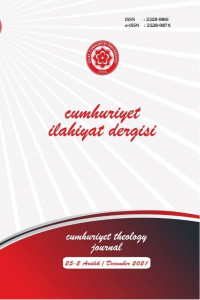Bir Bilgi Tanımının Eleştirisi: Devvânî’nin Risâle fî Ta‘rîfi’l-‘İlm Bağlamında
A Criticism Of the Definition of Knowledge: In The Context Of Jalāl al-Dīn Dav-vānī’s Risāla fī Taʻrīf ʻilm
Author(s): Mustafa Bilal ÖZTÜRKSubject(s): Theology and Religion, Islam studies
Published by: Cumhuriyet Üniversitesi İlahyat Fakültesi
Keywords: Kalām; Davvānī; Risāla fī taʻrīfi’l-ʻilm; Knowledge; Definition;
Summary/Abstract: This study discusses the treatise of Jalāl al-Dīn Davvānī (d. 908/1502) named Risāla fī taʻrīf ʻilm. This treatise criticizes a definition of knowledge adopted by some theologians in the late period (mutaʾakhkhirīn). The definition of knowledge at issue consists of three components: Attribution, discernment, no possibility of contradiction. Knowledge is an attribute as a category and with this attribution, a discernment is obtained. As a result of this process knowledge is acquired and there should be no possibility of this knowledge to be inconsistent. Davvānī examines eight possibilities of the definition on knowledge. In each of these eight possibilities a different problems arises. According to Davvānī, the definition mentioned is problematic in all probability. Nonetheless, Davvānī does not propose another definition of knowledge that can replace the definition of knowledge that he criticizes. This article represents the process of reaching the definition of knowledge stated in the history of theological thought. The definitions on knowledge made from the first period (al-mutaqaddimīn) are summarized and the strengths and weaknesses of these definitions are explained. There are two main approaches regarding the nature of knowledge in Islamic thought: According to the first approach pioneered by Fakhr al-Dīn Rāzī (d. 606/1202), absolute knowledge is a priory (badīhī) and undefinable. According to the second one, the nature of absolute knowledge is a posteriori (naẓarī) and definable. The first part of this article includes the definitions and criticisms of knowledge in Islamic thought. The second part discusses the claim of originality. In the second part, Davvānī’s treatise will be evaluated for the first time. According to the conclusion of the treatise, the definition made to find the essence of knowledge is unfounded in all respect. It is important to evaluate the treatise as a reflection of anti-essentialism in the history of Islamic thought. Most contemporary studies do not count this treatise among Davvānī’s works. In the biography book al-Aʿlām written by Khayr al-Dīn al-Ziriklī (d. 1976), Risāla fī taʻrīf ʻilm is counted among the works of Davvānī. In the introduction of more than one manuscript, the work is clearly attributed to Davvānī. As a result of the double-sided research, it has been ensured that the work belongs to Davvānī. However, in other two manuscripts containing the same treatise, the work is shown as belonging to an unknown person named Şāirzāda. But there is no information found about this person. This name seems more like a copyist (mustansıh) than an author. Possibly, such a mistake occurred as a result of confusing the two names. Davvānī’s small volume treatise sheds light on the intellectual atmosphere and level of its period. The definition of knowledge mentioned in the classical theology book of ‘Aḍud al-Dīn al-Ījī (d. 756/1355) called al-Mawāqif is superior to other definitions of knowledge. Instead of this definition of knowledge, which is presented as perfect, Jurjānī (d. 816/1413) preferred the definition of knowledge attributed to al-Māturīdī (d. 333/944) in the Sharḥ al-Mawāqif. This preference has been accepted as an implicit criticism for future generations, including Davvānī. Those who claimed that Jurjānī did not taken a random choice, carried on their criticism by going over the definition. The fine craftsmanship revealed in the treatise reveals that critical thinking is used intensively. The properly understanding of the treatise depends on knowing the science of logic and following it with intense attention. The definition of knowledge is examined from various angles with the help of concepts such as conception, ratification, judgment and contradiction (nakz) of the science of logic. In the science of logic, every layer of knowledge such as certainty, conjecture, imitation, doubt is investigated one by one. In the science of kalām, attention is paid that the ideal level of knowledge is precise. An uncertain knowledge is not considered knowledge according to kalām. Because the main goal of theologians is to build religious beliefs on the obtained certain knowledge. It is not accepted to base knowledge to a probable information on imprecise knowledge. For a knowledge among the knowns to reach the level of certainty, it must be correct and exclude other possibilities. Another condition is required for certainty in the definition of knowledge that Davvānī examines in his treatise is that the opposite is wrong. The fact that a piece of information is considered true depends on the fact that its reverse is false. In this treatise, it is discussed how to look for the contradictions or discrepancy that are wanted to be excluded. Knowledge is inseparable from the human mind, from outside of the world, or from the relationship between the two.
Journal: Cumhuriyet İlahiyat Dergisi
- Issue Year: 25/2021
- Issue No: 2
- Page Range: 823-851
- Page Count: 29
- Language: Turkish

